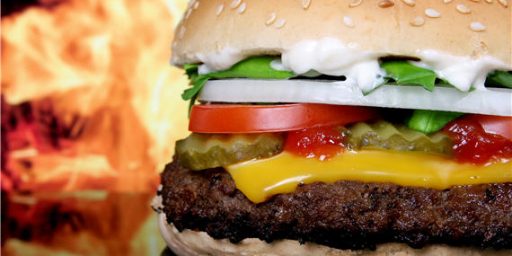Cheeseburger Bill
Fast-Food Chains Get a Break Today
The “cheeseburger bill,” approved 276 to 139, would prohibit people who are battling the bulge from going to court in an attempt to finger the food industry for their weight problems. Proponents of the measure said the fed-up well-fed would do better to look in the mirror for the cause of their trouble.
“The gist of this legislation is there should be common sense in the food court, not blaming other people in the legal court,” said Rep. Ric Keller (R-Fla.), the bill’s chief sponsor, whose district is home to Darden Restaurants Inc., owner of the Olive Garden and Red Lobster chains.
Only a few lawsuits against fast-food giants have been brought so far, and none has been successful. But some plaintiffs’ lawyers say juries soon may be ready to hold an industry that peddles fattening products through ubiquitous advertising — often aimed at children — at least partly liable for the rise in obesity and obesity-related diseases.
Nearly two-thirds of adults and 15 percent of children in the United States are overweight, and Americans spend $33 billion annually on weight-loss products and services, according to federal statistics. The surgeon general has said that the social cost of obesity is about $117 billion a year. And a study released this week by the Centers for Disease Control and Prevention found that obesity could overtake smoking next year as the leading cause of preventable death.
Several of the bill’s opponents, who included most Democrats, said suing fast-food chains probably is not the answer. But banning lawsuits is more about helping a special interest group shore up its bottom line than about shrinking the waistlines of millions of Americans who are at increased risk of heart disease, stroke and hypertension, they said.
Kevin Drum is of two minds,
On the one hand, I don’t think much of using civil damage suits aimed at a specific industry as a way of changing social policy. Down that road lies madness.
But at the same time, I also don’t think much of Congress exempting specific industries from the civil justice system. That can lead to some madness of its own.
His commenters are less balanced, mostly sounding the virtues of litigation and the evils of large burgers.
It’s true, so far as I know, that no one has yet successfully sued a fast food chain for their inability to restrain their eating habits. But the same was true of the tobacco companies, who were undefeated for decades. Eventually, though, juries started to award massive damages to plaintiffs who engaged in voluntary, self-destructive behavior. Surely, if one can blame the cigarette companies for getting hooked on a recreational product with a giant warning label on it and fifty years or so of public health campaigns telling us of the evils of their product, a jury will eventually hold McDonald’s liable for people’s obesity. After all, people actually need food.
Kevin writes,
Tentatively, I think I’m opposed to Congress fiddling in such a specific manner with the civil justice system. I’d rather have them propose general reforms that would broadly affect the ability to bring lawsuits like this. Once that’s done, let the system work equally for every industry.
Which works for me. I agree that aiming the legislation only at the fast food chains smacks of favoritism and, indeed, seems too narrowly focused to solve the problem, anyway. But a preemptive strike on something that’s completely foreseeable is reasonable in this case. And certainly within the scope of Congress’ power under Article III.






The cigarette comparison is an obvious one, and I see the point. On the other hand, juries only started handing out awards after documents started being made public that showed clear deceit on the part of tobacco companies about the dangers of their products.
As far as I know (?), fast food companies have never done anything similar. On the other hand, who knows what memos are lurking in their corporate files?
It’s a shame a bill is even needed in the first place. No one wants to take any personal responsibility. As usual, though, I can see multiple sides to an argument. I can envision fast food restaurant responsibility if the food they prepare if grossly more fat than comparably prepared food prepared in one’s home. As an example you would have to compare deep fried french fries at a restaurant to deep fried ones at home, not oven fries. Some chains would still probably fail to pass this test.
Could it be that junk-food may not be the main culprit in american obesity problem? Could it be that the whole of the food industry, most notably of the “common supermarket” variety, is actually at the root of all the metabolic monstrification?
Could it be that the media are once again going after the sitting duck because the deeper issue is too big to tackle?
Let’s wait another ten years for that part surface.